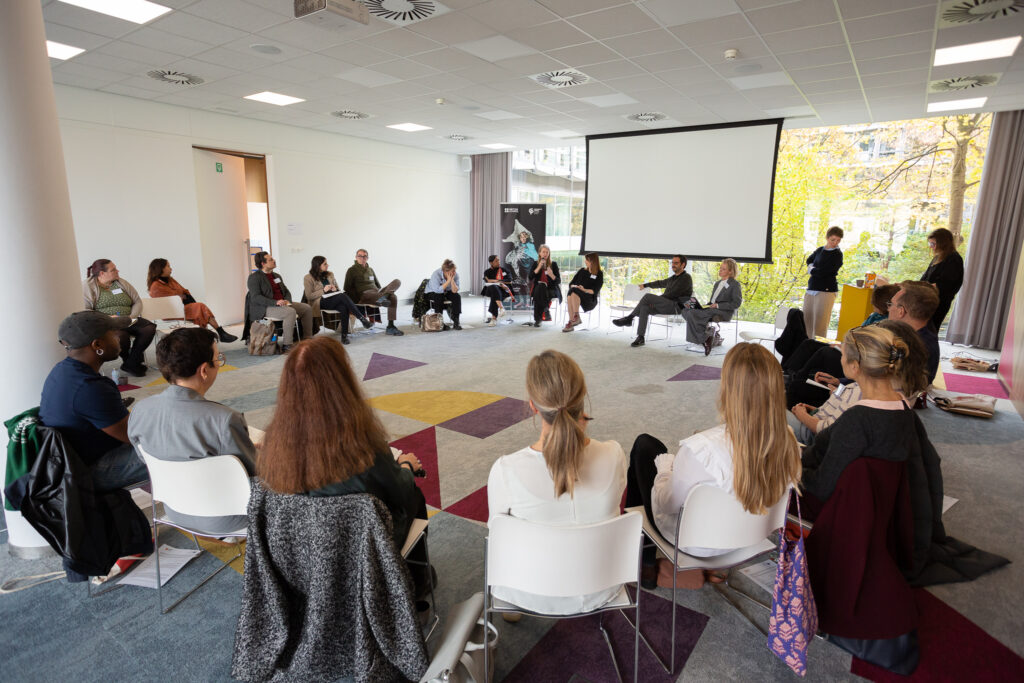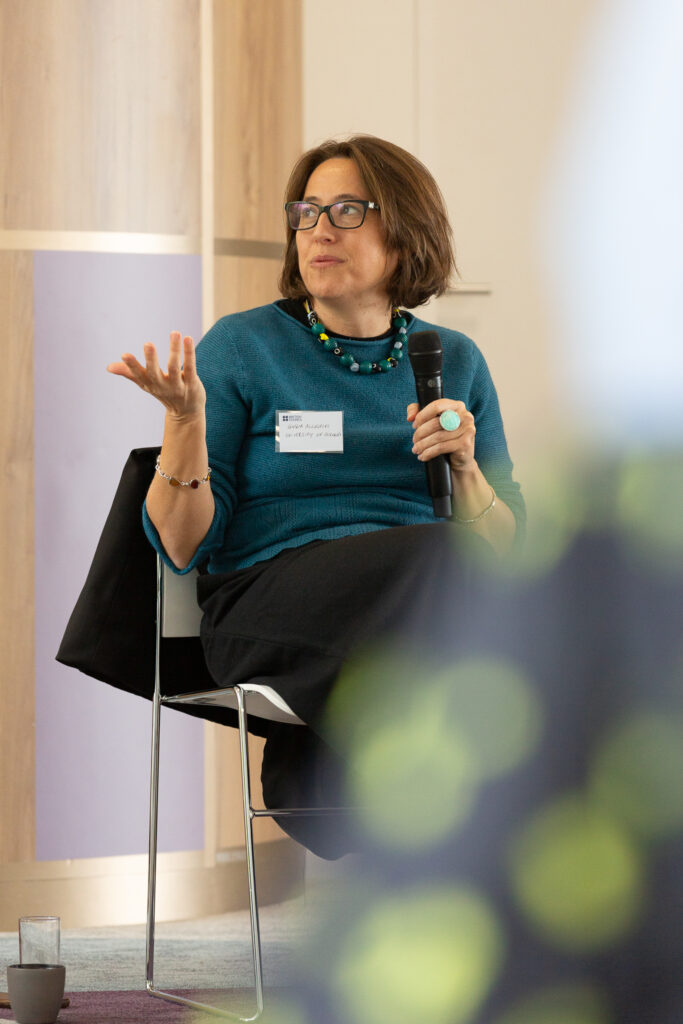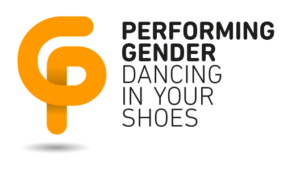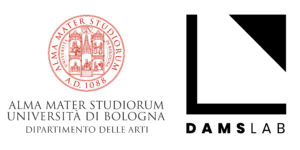Research dissemination
Description
The research team of the DAMSLab – University Bologna, composed of Roberta Paltrinieri, Giulia Allegrini, and Orkide Izci, beyond the collection and analysis of data, is also in charge of the dissemination activities as the scientific partner of the project.
At the end of the data collection, the research team started analyzing data from a sociological perspective and started presenting the first results in different contexts such as academic conferences, at the partners’ meetings/gatherings such as the Closing Lab (Boulevard Theather Festival, ‘s-Hertogenbosch), presentation and roundtable debate (Gender Bender Festival, Bologna) and Performing Gender Brussels Summit (European Commission, Brussels).

A final handbook will be drafted by researches from the University of Bologna in order to collect all the results of the project: the analysis of the methodologies, the academic evaluation of the impact of the project on the artists and the audience involved.
The University of Bologna – Department of the Arts DAMSLab plays the central role of scientific partner, building one or more models of horizontal audience engagement together with the cultural organisations, artists involved and the chosen communities, monitoring and testing the creative processes throughout the project.
Dissemination activities
The research team presented a paper titled “Cultural Welfare and Audience Engagement. A research within the European project Performing Gender-Dancing in Your Shoes.”
The presentation was based on these research questions, to which the research team gave an interpretation departing from the analysis and categorization of the collected data through interviews, focus groups, participant observation, working sessions based on participatory methodologies, and visual material collected during the project.
- What does it mean to immerse oneself in the dynamics of another living environment?
- What norms and power dynamics are embedded?
- What does it mean to have a sense of belonging, community, and solidarity? And what kind of co-creative art practices can foster them
- How to rethink artistic production processes, through what organizational practices and cultures, beyond non-economic values, and what social impacts can they have?
The research team presented a paper titled “Performing gender dancing in your shoes: bodies, subjectivities and community. A research on co-creation practices in the field of dance and performing arts”.
The presentation was based on exploring the complexity of working with the body in terms of identity, subjectification, and community building through co-creative practices; exploring it also as a field of possibilities.
Departing from aesthetic (hence political) choices and problematizations of identities from an intersectional perspective, situated within a multiplicity of relationships and positionalities (dancemakers, artistic directors, audience developers, and community), the presentation focused on the trajectories of working with the body and aesthetic research placed at the center of co-creative practices with communities; and proposed a reflection on how this field of identity work is problematized by the dancemaker, in dialogue with communities, and on the other hand what transformative-emancipatory aspects are recognized by the community.
The Closing Lab of the Performing Gender: Dancing in Your Shoes project occurred from August 3 to 13 in ‘s-Hertogenbosch during the Theaterfestival Boulevard. During the festival, all the partners gathered for the Closing Lab, which had moments of dance workshops led by different artists of the project, moments of reflection, conviviality, and the presentation of the communities’ final production.
In that week of sharing space, experiences, emotions, reflections and food, the research team presented the data analysis on which the handbook relies. It was a moment of giving back to the actors the results of the data analysis based on their lived experiences and narratives extracted from the focus groups and in-depth interviews.
During the presentation, we shared the different lived experiences, focusing on key issues, challenges, and learnings from the perspectives of the dancemakers, communities, artistic directors, and audience developers. Altogether, these aspects helped to outline what it means to promote and implement processes of artistic co-creation and community building and to open up a precious moment of debate and collective reflection.
On November 7th, the research team, in collaboration with Cassero, organized an open presentation to the public of the results achieved by the project at Damslab, one of the significant venues for the Bologna dance community and of the Gender Bender Festival.
A brief introduction to the project and a glimpse into the final results of the handbook were followed by a very participated and passionate moment in the presence of the dance makers from Italy who worked with the Bologna community and from England who worked with the Leeds community; their respective community members, artistic directors, and audience developers who narrated in first person their experiences departing from the questions posed by the research team:
- What does “being in other shoes” mean for you in relation to your experience in PG-DIYS?
- In which ways have you explored the possibility of “having many shoes to dance”?
- What have you learned or experienced thanks to the dance practices?
- What do power and co-creation mean for you after PG-DIYS?
- What are the transformative aspects you experienced, the criticalities, and the unexpected learnings you discovered?
A final reflection was offered by the discussant, Rossella Mazzaglia, Professor at the Department of the Arts of the University of Bologna, who gathered different thoughts and narratives kindly offered by all project actors.
Giulia Allegrini, based on three years of experience PG: DIYS as a scientific partner of the project, had an intervention in Brussels at the European Parliament on the “Re-evaluating evaluation. Social impact evaluation in PG:DIYS, perspectives and methodology”.

The presentation departed from the analysis of the process experienced in the project and the evaluation of the social impact of the implemented process, explained the whole implemented process impacts based on different scenarios of change, and opened up a debate around these questions and reflections crucial for a new perspective on how to evaluate community-based art projects proposing some key recommendations based on lived experiences of different actors involved to the Performing Gender: Dancing in Your Shoes project.
- Who has to manage the collection of data?
- In large-scale projects, there are key challenges: sustainability of the process, attention to specific context — place-based approach to social innovation (impact)
- The importance of qualitative data to catch in-depth processes (narratives—self-representation)
- The necessity to explore the combination between “standard” qualitative and quantitative research methods and other art-based research methods. This type of mix method approach how is seen by funders?


